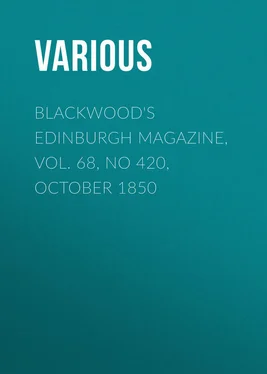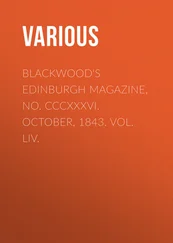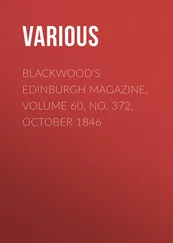Various - Blackwood's Edinburgh Magazine, Vol. 68, No 420, October 1850
Здесь есть возможность читать онлайн «Various - Blackwood's Edinburgh Magazine, Vol. 68, No 420, October 1850» — ознакомительный отрывок электронной книги совершенно бесплатно, а после прочтения отрывка купить полную версию. В некоторых случаях можно слушать аудио, скачать через торрент в формате fb2 и присутствует краткое содержание. Издательство: Иностранный паблик, Жанр: periodic, foreign_edu, Путешествия и география, на английском языке. Описание произведения, (предисловие) а так же отзывы посетителей доступны на портале библиотеки ЛибКат.
- Название:Blackwood's Edinburgh Magazine, Vol. 68, No 420, October 1850
- Автор:
- Издательство:Иностранный паблик
- Жанр:
- Год:неизвестен
- ISBN:нет данных
- Рейтинг книги:4 / 5. Голосов: 1
-
Избранное:Добавить в избранное
- Отзывы:
-
Ваша оценка:
- 80
- 1
- 2
- 3
- 4
- 5
Blackwood's Edinburgh Magazine, Vol. 68, No 420, October 1850: краткое содержание, описание и аннотация
Предлагаем к чтению аннотацию, описание, краткое содержание или предисловие (зависит от того, что написал сам автор книги «Blackwood's Edinburgh Magazine, Vol. 68, No 420, October 1850»). Если вы не нашли необходимую информацию о книге — напишите в комментариях, мы постараемся отыскать её.
Blackwood's Edinburgh Magazine, Vol. 68, No 420, October 1850 — читать онлайн ознакомительный отрывок
Ниже представлен текст книги, разбитый по страницам. Система сохранения места последней прочитанной страницы, позволяет с удобством читать онлайн бесплатно книгу «Blackwood's Edinburgh Magazine, Vol. 68, No 420, October 1850», без необходимости каждый раз заново искать на чём Вы остановились. Поставьте закладку, и сможете в любой момент перейти на страницу, на которой закончили чтение.
Интервал:
Закладка:
The head of treason applicable to the facts of the case under consideration is the third in statute 25 Edward III. c. 2, which concisely declares it to exist " if a man do levy war against our lord the King in his realm ." This has been the law of the land for just five centuries, i. e. since the year 1351. But in the application of these words, of fearful significance, the object with which arms are taken up must be a GENERAL one – "the universality of the design making it a rebellion against the state, a usurpation of the power of Government, and an insolent invasion of the King's authority" – "under pretence to reform religion and the laws, or to remove evil counsellors, or other grievances, whether real or pretended." 6 6 4 Black. Com., pp. 81-2.
Or, to adopt the definition of Mr Kelly, in addressing the jury in this very case, it is necessary to prove "that the prisoner levied war against her Majesty, with intent by force to alter the law, and subvert the constitution of the realm." 7 7 Townsend, vol i., p. 54.
To appreciate the position of the prisoner, and the difficulties with which his counsel had to struggle, it may here be mentioned, that he admitted the prisoner to be a Chartist, as it was called – that is, a supporter of the following five points of sweeping change in the political institutions of the country, – "Universal suffrage, vote by ballot, annual parliaments, no property qualification, and payment of members of parliament." This was also, during the trial, avowed by the prisoner. 8 8 Ibid. vol. i., p. 45.
Having thus got a clear view of the law, let us briefly indicate the facts – the palpable, notorious, leading facts, known to be such by the prisoner's counsel, as soon as they had perused their briefs.
A body of ten thousand men, principally miners from the surrounding country, headed, in three divisions, by Frost, and two other men, Jones and Williams, (Frost having five thousand under his command,) and armed indiscriminately with muskets, pikes, axes, staves, and other weapons, was to make a descent upon the peaceful town of Newport, during the night of Sunday, the 3d November 1839! Tempestuous weather prevented the preconcerted junction of these three bands; but, between eight and nine o'clock on the Monday morning, Frost's division, five thousand strong, marched into the town – and, headed after a fashion by him, commenced an attack upon a small inn, where they knew that a handful of troops was stationed, about thirty in number, under command of a lieutenant. As soon as the mob, who formed steadily, saw the soldiers drawn up in the room – the windows of which were thrown open – they cruelly fired into it, and also rushed through the doors into the passage. On this, the lieutenant gave the word of command to fire. He was obeyed – and with deadly effect, as far as regarded some thirty or forty, known to have received the fire, many of whom were shot dead on the spot. But this cool promptitude and determination of the troops put an end instanter to the insane insurrection. This vast body of supposed desperadoes fled panic-struck in every direction; and Frost himself, who was unquestionably on the very spot at the very time when and where the attack commenced, fled in ridiculous terror, 9 9 "I thought he was crying ," said one of the witnesses! – p. 23.
and was arrested that evening at a friend's house adjoining his own, armed with three loaded pistols, and having on him a powder-flask and a quantity of balls. His brother heroes, Williams and Jones, were also arrested, together with many others; and there ended the formidable outbreak, which had more astounded than alarmed the public; leaving, however, the instigators and conductors to a speedy and very dismal reckoning with that same public. The active management of matters by Frost was beyond all doubt, and it seemed never to have been wished to conceal it. He was the Jack Cade of the affair. He planned the order of march; the time, place, and mode of attack; and explained the immediate and ulterior objects of the movement. Shortly before the outbreak, he was asked by one of his adherents, " what he intended to do ?" He answered, —
"First, they should go to the new poor-house and take soldiers and arms; then, he said, there was a storehouse, where there was plenty of powder; then, they would blow up the bridge, that would stop the Welsh mail which did run to the north, and that would be tidings; and they would commence there in the north on Monday night, and he should be able to see two or three of his friends or enemies in Newport." – (vol. i., p. 36.)
Similar observations he made to another of his followers, who asked him, on hearing him give orders for the guns to take the front, the pikes next, the bludgeons next, – "in the name of God, what was he going to do? was he going to attack any place or people?" he said, —
"He was going to attack Newport, and take it – and blow up the bridge, and prevent the Welsh mail from proceeding to Birmingham: that there would be three delegates there, to wait for the coach an hour and a half after the time; and if the mail did not arrive there, the attack was to commence at Birmingham, and be carried thence to the North of England, and Scotland, and that was to be the signal for the whole nation ." – (vol. i., p. 33.)
The coal and iron trade in these parts, from which the population derived their subsistence, had seldom been more prosperous than at the time when this movement was concerted and made: employment was easily obtained; wages were high; and those concerned in the affair had no private grievances to redress. At the same time, it was notorious that political agitation, on the subject of the Charter aforesaid, had for some time prevailed there – that the population had been organised for combined and effective action by affiliated societies; and Frost, the prime mover – a pestilent agitator, who, occupying the position of a decent tradesman, a linendraper, in Newtown, had been rashly raised to the local magistracy, from which he was soon degraded for sedition – declared his object to be, to make the Charter the law of the land. All these, and many other facts, which had been elicited during the preliminary examinations, were known to the prisoner's counsel, who had copies of all the depositions which had been made by the witnesses; and also knew the precise terms in which the indictment was framed, and the name, calling, and residence of every witness to be produced in proof of that indictment.
How was this towering array of facts to be encountered, with these enlightened judges to conduct the inquiry, and guide the jury, and very able and determined counsel to elicit and arrange the facts, and enforce them on the jury – and have the last word with the jury in so doing? We may well imagine how anxious and disheartening were the consultations of the prisoner's counsel before going into court. Neither they, nor their attorneys, could disguise from themselves the desperate nature of the case in which they were concerned. They would probably determine to cross-examine the witnesses very cautiously and rigorously, with a view to breaking down important links in the case; and it is likely that their paramount object in conducting the defence, would be to aim at supplying Frost with some other than a general object – something else than establishing the Charter as the law of the land. A hopeful prospect! But besides all this, it must have been determined, of course, to throw no single chance away, whereon – however, whenever it presented itself – to fight the fearful case for the Crown inch by inch, and foot by foot – contesting every technical point, with a view to detecting any possible slip in either the preliminary or any other part of the proceedings of the experienced and watchful Crown officers. Here, again, was a hopeful prospect! Their proceedings had been doubtless advised beforehand by the Attorney and Solicitor General, and conducted by Mr Maule, the Solicitor of the Treasury, in person – himself a barrister, and consummately qualified for his post. He was also a humane man, always anxious to discharge his duties firmly, but at the same time to afford a prisoner every degree of consideration and indulgence consistent with the public interest. By this time the reader may be aware how very serious a thing is the conduct, on the part of the Crown, of a prosecution of high treason, in every one of its stages – in the slightest particulars – especially where the great facts of the case are so clear against the prisoner, as to compel his advocate to watch and test every link in the chain fixed around his client. Here, in fact, correlative duties are cast on the opposing parties – to take every possible objection; and to be beforehand prepared for every possible objection, by vigilant exactitude in complying with every legal requisite.
Читать дальшеИнтервал:
Закладка:
Похожие книги на «Blackwood's Edinburgh Magazine, Vol. 68, No 420, October 1850»
Представляем Вашему вниманию похожие книги на «Blackwood's Edinburgh Magazine, Vol. 68, No 420, October 1850» списком для выбора. Мы отобрали схожую по названию и смыслу литературу в надежде предоставить читателям больше вариантов отыскать новые, интересные, ещё непрочитанные произведения.
Обсуждение, отзывы о книге «Blackwood's Edinburgh Magazine, Vol. 68, No 420, October 1850» и просто собственные мнения читателей. Оставьте ваши комментарии, напишите, что Вы думаете о произведении, его смысле или главных героях. Укажите что конкретно понравилось, а что нет, и почему Вы так считаете.












